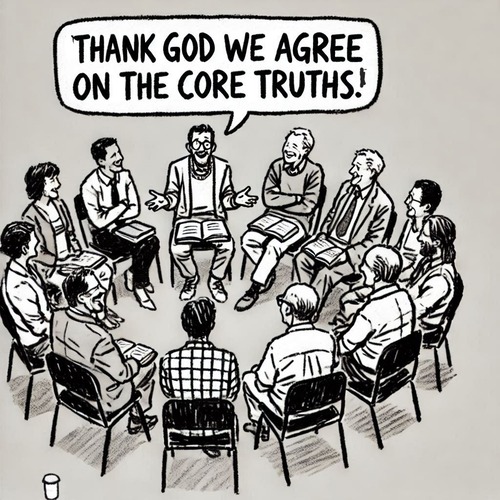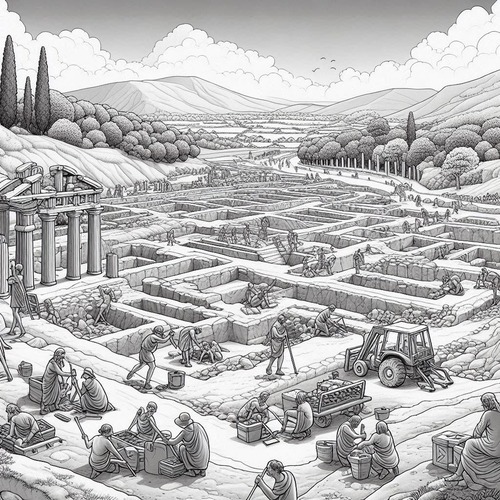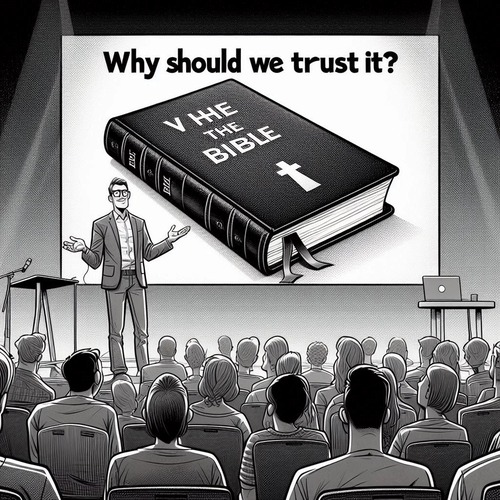Covenant Theology Vs Dispensationalism: Bible Frameworks Explained
Ever wondered why different Christian churches and denominations sometimes interpret the Bible so differently? Much of this comes down to two major frameworks for understanding Scripture: Covenant Theology and Dispensationalism. Think of these as different “lenses” through which Christians read and interpret the Bible.
Imagine you’re looking at a large mural. One person may focus on the overall unified theme, while another may notice how the artwork is divided into distinct sections. Similarly, these theological frameworks offer different ways of understanding God’s story in Scripture.
Covenant Theology Vs Dispensationalism: Before we dive in, let’s acknowledge these are complex topics that scholars have debated for centuries. We’ll break them down into digestible pieces, explaining terms as we go along.
WHAT IS COVENANT THEOLOGY?
The Basics: Covenant Theology sees the Bible as unified by a series of important covenants (formal agreements) between God and us. Think of these covenants as chapters in one continuous story—all pointing to Jesus Christ.
The Three Main Covenants
The Covenant of Redemption represents an eternal agreement made between God the Father and God the Son before time began. In this covenant, the Father would send the Son to save humanity, and the Son willingly agreed to come to earth and complete the mission of salvation. This covenant forms the foundation for God’s entire plan of redemption.
The Covenant of Works was established with Adam in the Garden of Eden and had straightforward terms: obey God and live, disobey and face death. When Adam failed to keep the covenant, the consequences affected all of humanity, introducing what theologians call “original sin” into the human experience. The covenant helps us understand why humanity needed salvation in the first place.
The Covenant of Grace is God’s plan to save people through faith, beginning immediately after Adam and Eve’s fall and continuing through the entire biblical narrative. This covenant finds its ultimate fulfillment in Jesus Christ, demonstrating God’s consistent commitment to redeem humanity. Through this covenant, God promises to be their God and make them His people—a promise sealed in Christ’s blood.
Key Ideas in Covenant Theology
- The church is seen as the “new Israel”
- Old Testament promises to Israel are fulfilled in the church
- There’s one people of God throughout history, saved by faith
- The Old and New Testaments are deeply connected and unified
WHAT IS DISPENSATIONALISM?
The Basics: Dispensationalism sees God working with humanity through different “dispensations” or periods of time. Each period has its own way that God tests and deals with His people.
Think of dispensations rather like different seasons in history—each with its own rules and ways God interacts with people. It’s like how parents may have different rules for their children at different ages—the parent remains the same, but the rules change as the child grows.
The Seven Dispensations
The Dispensation of Innocence (at the Garden of Eden): Here, Adam and Eve lived in perfect harmony with God, untouched by sin. This period ended dramatically with Adam and Eve’s disobedience, forever changing humanity’s relationship with God. These events established the context for all of human history that would follow.
The Dispensation of Conscience (from the Fall to the Flood): Here, people were guided primarily by their conscience to determine right from wrong. The period demonstrated human conscience alone was insufficient to lead people to righteousness. The dispensation concluded with the flood, as humanity had become so corrupt, with only Noah’s family remaining faithful.
The Dispensation of Human Government (Post-Flood to Babel): began after the flood, when God granted us authority to govern ourselves and establish justice. This period demonstrated both humanity’s capacity to organise societies and our tendency toward pride and self-reliance. The dispensation concluded with the Tower of Babel, where human pride led to divine intervention.
The Dispensation of Promise (from Abraham to Moses): is marked by God’s special promises to Abraham and his descendants. During this time, God began to form a specific people group through whom He would bless all nations. The period showed both the faithfulness of God to His promises and the patience with which He developed His chosen people.
The Dispensation of Law (from Moses to Christ) is characterised by God giving detailed laws and regulations to the nation of Israel. The period revealed humanity’s inability to achieve righteousness through law-keeping, while simultaneously preserving and preparing God’s people for the coming Messiah. The dispensation ultimately pointed to the need for a perfect sacrifice and a better covenant.
The Dispensation of Grace (also called the Church Age), is our current period, beginning with Christ’s death and resurrection. During this time, salvation comes through faith in Christ alone, and the Holy Spirit indwells believers. This present dispensation will continue until Christ’s return for His church.
The Dispensation of the Kingdom (the future millennium), a thousand-year period of Christ’s perfect rule on earth. During this time, Jesus will reign physically from Jerusalem, and creation itself will be partially restored to its original glory. The final dispensation will demonstrate what life on earth was meant to be under God’s direct rule.
Key Ideas in Dispensationalism
- Israel and the Church are distinct groups with different promises
- Prophecy is usually interpreted literally
- Future restoration of Israel as a nation
- Emphasis on end-time prophecy
COVENANT THEOLOGY VS DISPENSATIONALISM: THE MAJOR POINTS OF DIFFERENCE
- Israel and the Church: Covenant Theology sees the church as the continuation of Israel. Dispensationalism sees Israel and the church as separate groups with different promises
- Prophecy: Covenant Theology often interprets prophecy symbolically. Dispensationalism usually interprets prophecy literally
- The Kingdom of God: In Covenant Theology the kingdom is primarily spiritual and present now. In Dispensationalism, the kingdom is both spiritual now and will be literal in the future
- Understanding the Bible: Covenant Theology emphasises the unity and continuity of God’s plan. Dispensationalism emphasises the distinctions between different eras
- Law and Grace: In Covenant Theology the moral law continues to guide Christians. Dispensationalists see Christians living under grace, not law
COVENANT THEOLOGY VS DISPENSATIONALISM: CONCLUSION
To make this clearer, think about the two approaches as different ways of organising our bookshelves:
- Covenant Theology arranges everything by theme (like one continuous story)
- Dispensationalism arranges by time period (like a historical timeline)
The thematic approach of Covenant Theology helps us see the beautiful continuity of God’s character and promises throughout Scripture. Meanwhile, the chronological perspective of Dispensationalism helps us appreciate the progressive nature of God’s revelation and the unique characteristics of each biblical era.
In our next instalment, we shall explore how these traditional frameworks have evolved through Progressive Covenantalism and Progressive Dispensationalism, and see how modern scholars have worked to bridge some of these historical divides. We’ll also look at practical implications for Christian life and ministry, and consider how these frameworks continue to shape biblical interpretation today.
For now, let’s remember that while these interpretative differences are significant for biblical study, they need not create division within the Body of Christ. At the heart of both systems lies the unchanging truth of salvation through Jesus Christ and God’s faithful love for His people. It’s this core message that unites all believers, regardless of their preferred theological framework.
[In Part 2 of our post, we shall explore modern developments in these theological systems and their practical implications for Christian life and ministry. DO CHECK OUR POST BELOW]COVENANT THEOLOGY VS DISPENSATIONALISM—OUR RELATED POSTS
Editor's Pick

Will We Remember This Life in Heaven? What Isaiah 65:17 Means
"Will I remember my spouse in heaven? My children? Will the joy we shared on earth matter in eternity?" These [...]

From Empty to Overflow: The Abundant Life Jesus Promised
(AND WHY YOU SHOULDN’T SETTLE FOR LESS) We're surviving, but are we thriving? If we're honest, there's a gap between [...]

What Does Jesus Save Us From?
THREE BIBLE TRUTHS ABOUT SALVATION "Jesus saves." We’ve seen it on bumper stickers, heard it shouted at sporting events, maybe [...]

If God Wants Everyone Saved, Why Aren’t They?
THE REFORMED VIEW ON GOD’S DESIRE VS HIS DECREE The question haunts every believer who has lost an unbelieving loved [...]

The One Man Mystery in Acts 17:26: Is It Adam Or Noah?
When the Apostle Paul stood before the philosophers at Mars Hill, he delivered an insightful statement about human unity: “And [...]

Megiddo Or Jerusalem: Where Did King Josiah Die?
Recent archaeological discoveries at Tel Megiddo continue to reveal evidence of Egyptian military presence during the late 7th century BC, [...]

Losing Your Life Vs Wasting It: How Are the Two Different?
AND WHY DID JESUS PRAISE THE FORMER? Jesus spoke one of the most perplexing statements in Scripture: “For whoever wants [...]

Can Christians Be Demon Possessed? What the Bible Teaches
Perhaps you’ve witnessed disturbing behavior in a professing Christian, or you’ve struggled with persistent sin and wondered if something darker [...]

Sacred Fury: What Christ’s Temple Cleansing Truly Means
Mark 11 records the crack of a handmade whip that echoed through the temple corridors. Tables crashed to the ground, [...]

Did Jesus Cleanse the Temple Twice?
OR DID JOHN DISAGREE WITH THE SYNOPTICS ON TIMING? One of sceptics’ favourite "gotcha" questions targets what they see as [...]
SUPPORT US:
Feel the Holy Spirit's gentle nudge to partner with us?
Donate Online:
Account Name: TRUTHS TO DIE FOR FOUNDATION
Account Number: 10243565459
Bank IFSC: IDFB0043391
Bank Name: IDFC FIRST BANK






